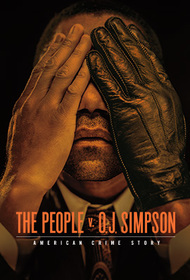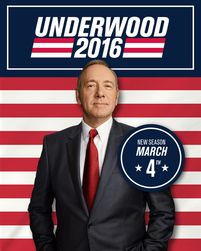 Henry McKeand Editor-in-Chief and A&E Editor Some of the best art imitates life by focusing on the issues that mean the most to audiences, so it is fitting that two of the most talked-about shows being produced right now, American Crime Story: The People vs. O.J. Simpson and House of Cards, mirror key current events. The two shows deal with their respective subjects very differently, but they each capture some of the public opinion of today. American Crime Story: The People vs. O.J. Simpson: When this FX miniseries event focusing on O.J. Simpson’s infamous trial was announced, it was easy to feel skeptical. After all, the executive producers are Ryan Murphy and Brad Falchuk, the duo that brought viewers shows such as Nip/Tuck, Glee, American Horror Story, and Scream Queens. For better or worse, their strain of television focuses heavily on the shallow and the sleazy, so it seemed unsettling to imagine that they would be applying their style to one of the sleaziest, most shallow events in recent history. It felt realistic to predict that the show would only focus on, and exploit, the most sordid and shocking details of the case. But despite all odds, this series, created by Scott Alexander and Larry Karaszewski, is a thoughtful and entertaining look at a time when all of the nation’s hidden tensions began to bubble up to the surface. First off, the show is visually stunning and features some of the best direction you can find on basic cable. It captures the feel of the early ‘90s perfectly, and there is a sweaty, claustrophobic feel to these episodes, the first two of which were directed by Murphy. Even Murphy’s greatest detractors will have a hard time finding fault in his skills behind the camera in these installments, and he sets a non-stop pace that never lets up. It may be based on a real life court case, but the show feels as exciting and suspenseful as any action series, which is even more impressive considering the fact that virtually everyone knows how this story ends. The acting is no less spectacular. Cuba Gooding Jr. may share little resemblance to Simpson, but his performance is breathtaking. His vulnerability and desperation can be felt through the screen, and every scene with him is a knockout. John Travolta also shines as defense attorney Robert Shapiro. Even his bizarre makeover to make him look more like Shapiro, complete with sun-tan and wig, cannot distract from the veteran actor, who looks as if this is the most fun he has had had in twenty years. More surprising is David Schwimmer, known to most for playing Ross in Friends, as O.J’s close friend and lawyer Robert Kardashian (Yes, the father of those Kardashians). His nuanced performance suggests a dramatic range that could not show itself during his sitcom days. Courtney B. Vance, who plays the flamboyant attorney Johnnie Cochran, and Sarah Paulson, as prosecutor Marcia Clark, are both superb as well. Paulson especially excels as Clark, who is presented as the one character who is capable of completely ignoring O.J.’s celebrity and only focusing on the facts. The best part of the show may be how well the writers tie the courtroom drama in with the overarching social issues that made the case so divisive. The first images of the series are of the beating of Rodney King, and this is a powerful reminder of the state of race relations at the time. Simpson’s race becomes one of the main plot points as the show goes on. What is startling is how similar the show’s environment is to our own, with the same racial discord and police brutality that exists today. The show has even reignited debates about Simpson’s supposed innocence, even leading to a new development in the two-decade-old murder case. Last Friday, the Los Angeles Police Department announced that a knife was found on Simpson’s estate over ten years ago. Former police officer George Maycott received the knife from a construction worker who allegedly found the knife. Maycott was told that the knife could not be of any use as Simpson was already tried, and he took the knife home and forgot about it until recently. Now the knife is being tested for DNA samples that could link the knife to the murder. It seems unlikely that his decision to bring the evidence forward is not related to the show in some way. If anything, this development is a testament to the show’s quality. Any entertainment property that can cause this kind of stir must be doing something right.  House of Cards: At its worst, House of Cards comes off like an SNL skit that takes itself too seriously. Played by Kevin Spacey, protagonist Frank Underwood is a mustache-twirling villain who can barely hide his evil intentions under his deep, comforting southern drawl. It seems preposterous to think that such a man could reach the level of power that Underwood, who is now defending his presidency in a cut-throat race that threatens everything he has ever built, has in the show. This lack of realism has, at times, led to moments so unbelievable that they rob the show of any real dramatic power. Before, it was easy to laugh at the claims from viewers that House of Cards somehow revealed the “dark side” of Washington. It is fantasy, through and through, and it has not come close to approaching realism since its superior first season. While this still applies to the fourth season, which was made available on Mar. 4, there are some new and disturbing parallels between the presidential race depicted in the show and the one taking place right now in the real world. Now, in the middle of one of the most divisive elections in the nation’s history, some of Underwood’s shenanigans do not seem quite as ridiculous. Some plotlines share an uncanny resemblance with news stories that were featured long after production on the new season finished. One important story component this season involves Underwood’s father having a supposed involvement with the Ku Klux Klan (KKK), and it is almost as if the writers could see into the future and chose to borrow ideas from Donald Trump’s recent KKK controversy. There are other parallels to current events, and characters such as the brash, people-pleasing Republican and the strong, female Democrat have obvious real world counterparts. This certainly does not mean House of Cards has evolved into a subtle, nuanced reflection of current events. As usual, show-runner Beau Williamson and his team of writers are interested in the sordid things Underwood is willing to do. There are enough double crosses, unholy alliances, and over-the-top revelations to satisfy the show’s rabid fan base, and many viewers will find themselves speeding through the season in one lazy weekend. It is perhaps fitting that one of the most popular shows in recent memory revolves around a power-hungry sociopath whose general contempt for the American people and other politicians allows him to climb all the way to the top. Underwood serves two important cathartic purposes for frustrated Americans. He is an easy-to-hate villain who serves as an emotional scapegoat for any supposed corruption in Washington, but he also appeals to people who feel that he would at least get things done in his office. To some, a man like Frank Underwood would be a welcome addition to the political scene, and his aggressive strategies can seem attractive at times to those who believe that modern politicians are too ineffective and interested in re-election. In the logic of the show, the fact that he is not afraid to step on anyone, including people in his own party, actually earns him support. If this sounds familiar, it is probably because something very similar is happening right now in the non-fictional world. With each passing year, T.V. becomes more respected as a medium, and more and more shows are addressing major issues in mature and intelligent ways. While serious social commentary is certainly not appropriate for all shows, it is encouraging to see that at least some are tackling the things that matter most. Comments are closed.
|
Archives
March 2017
Categories
All
|

